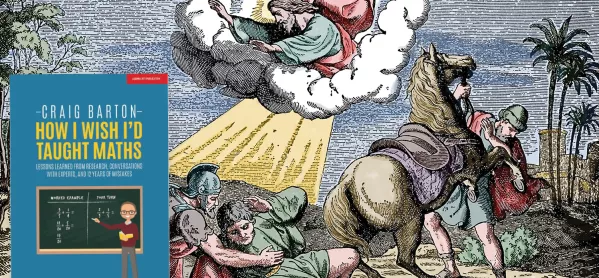- Home
- Book review: How I Wish I’d Taught Maths
Book review: How I Wish I’d Taught Maths

Most of us never question or challenge the beliefs and views we hold most deeply. It’s an evolutionary trait to develop a view of the world that works for us and stick to it rigidly. Breaking out of this is hard and uncomfortable - and leads to all sorts of interesting phenomena, such as cognitive bias.
That said, people do change their minds on important things. Saul the persecutor of Christians became Paul the evangelist and martyr. US secretary of defense Robert McNamara took a very different view of the Vietnam War later in life. Mikhail Gorbachev went from communist leader to introducer of perestroika and glasnost in the USSR. And because of their public roles, these people executed their U-turns for all to see - the rest of us can do them privately.
It could have been the same for Craig Barton, who completely changed his mind on how to teach maths. Instead of quietly shifting his practice, he has been brave enough to write an entire book about it. And it’s great. I love it, I really do.
A declaration of interest: like Barton, I’m a maths teacher and perhaps that is why this book sang to me the way it did. After 15 years in the classroom and headteacher’s office, this autumn, I left the school I set up to work in the world of education policy. And while I love my new role, I also miss the buzz of school life and my students and colleagues.
I also miss teaching - but I don’t miss the feeling, towards the end of my time in the classroom, of being nowhere near as good a practitioner as I used to think I was. I was always a teaching head, but as I learned more about how learning happens and what effective teaching is like, I became frustrated that, owing to my other responsibilities, I never had time to address things properly and get better.
Clear and concise
What Barton captures so well in this book is the way he too came to the conclusion that he had it all wrong - and what he then did about it. He lays it out clearly and concisely, systematically working through key misconceptions that he held and for each one going through the key reading and research that challenged these, what he learned from that and what he now does differently.
Its structure makes the book eminently readable. I dipped in and out of it when I had spare moments and took away lots.
To give an example: he dedicates a section to examining the motivations for - and implications of - giving students choice in the learning they do. He, like me, used to think that by allowing them to choose the work they did, students would both be more engaged and take more responsibility for it. Been there, done that, got the T-shirt - and the mental scars to prove it, too. I’m sure lots of us have.
I don’t think I’ll ever forget the lesson where I spent more time explaining to students that no, they couldn’t just choose three starters and a dessert from the menu of activities I’d given them, they had to have a “main course”, too. I couldn’t tell you what topic we were covering - and I bet they couldn’t, either.
The reader is led through the research that challenges the concept and then given a few “takeaways” - key points that sum up the learning and point towards a better approach. Finally, Barton details what he now does differently. In this case: far less choice, or limited choice from pre-selected tasks.
It’s a fieldbook, designed to help maths teachers reconsider things they may take for granted in a way that provides both the impetus for change and practical alternatives. It gives the truth, but also the hope.
Perhaps most interestingly for me was the way it got me fired-up again about maths teaching. As I sat there reading, I would find myself thinking “if I were head of department, I’d get the team to stop doing that” or “when I next teach I’ll definitely do that”. Perhaps it’s not only a book just for current teachers but also the swaths of ex-teachers who tell themselves that one day they’ll go back to the front line.
I wish How I Wish I’d Taught Maths had been written sooner. That said, Craig Barton has written it now - and if you’re a teacher who wants to know a bit more about the best subject on the curriculum, this is a great way to grapple with some of the biggest questions in our profession right now.
Disclosure: Craig Barton is a maths adviser for the parent company of Tes magazine.
Mark Lehain is director of Parents and Teachers for Excellence and former headteacher of Bedford Free School. He tweets @lehain
Keep reading for just £1 per month
You've reached your limit of free articles this month. Subscribe for £1 per month for three months and get:
- Unlimited access to all Tes magazine content
- Exclusive subscriber-only stories
- Award-winning email newsletters


